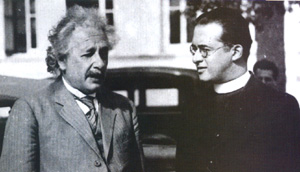Aristotle -> Aquinas -> Atheism, Part 5
by nonewsisnew
Proof 3: Contingency
The proof from contingency works as follows: Some finite things depend upon other things. To have a chair it is first necessary to have a tree, to have a tree it is first necessary to have soil, to have soil it is first necessary to have sand, to have sand it is first necessary to have rock, and so forth. The nature of things is such that other things are used to make them.
Aristotle’s material cause points out that the materials that are used to make something will shape what that thing will be like. A rock made from magma will be different from a rock made from sediments. Aquinas uses this principle to think about where matter came from. If things come from other things, we have an infinite chain which can never find its start. Therefore there must be a being like from the first two proofs that exists outside of contingent things to get the world started.
As Monseigneur Lemaître’s big bang theory goes: first there was nothing, then it exploded.
There must have been a cause of that explosion, by which material things gain their matter. This cause, like the two before it, has to be eternal and non-material to make any logical sense.
To sum the first three proofs then is to point out that our world makes no logical sense if we don’t have an eternal, non-material and not caused source of our world. According to Aquinas, this source is what we call God.
Dawkins argues that the above definition of God doesn’t yet include his other attributes, such as “omnipotence, omniscience, goodness, creativity of design” and so forth. How true this is, but then again, it’s only three arguments for the existence of God out of many arguments. The countless others help flesh out these five from Aquinas, who isn’t concerned with proving God per say, but very concerned with showing faith mixes with reason.

“The difficulty of explaining ‘why I am a Catholic’ is that there are ten thousand reasons all amounting to one reason: that Catholicism is true.” – G. K. Chesterton
Dawkins other argument is that the above three proofs all amount to cosmological arguments from which God himself can’t escape. In other words, why doesn’t God also need to be caused?
Understood within the context of Aquinas trying to process Aristotle, this counter argument makes little sense. The non-theistic philosophy of Aristotle proved these causes must exist, and need to have a start at some point. All Aquinas does is to describe that start as God. It would be a truism that God is immune from the infinite regress problem because he as been defined by Aquinas as the eternal source pointed to by both Aristotle and the Prophets — pointed to by Reason and Faith.
Dawkins argues that the above definition of God is misleading, because there could be a natural source. However, this counter argument doesn’t fit within the logical framework of Aristotle nor does it match our current scientific understanding of the world. Aristotle showed any natural endpoint to the infinite regressions above would need to be eternal, and science, through it’s wide acceptance of the Big Bang Theory (a term originally coined by atheist Fred Hoyle to denigrate the priest who came up with it), has shown that in nature there is no such thing. Only by rejecting the logic of Aristotle and what scientists currently tell us might we consider a natural endpoint to the regressions. Aristotle might be shown to be incorrect, and science might tell us something different in the future, but Dawkins argues for neither of these points.
